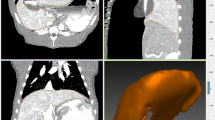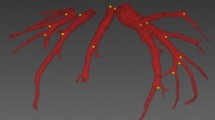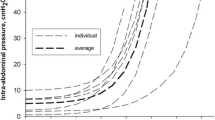Abstract
Purpose
Different effects on cardiovascular and respiratory systems and liver are associated with pneumoperitoneum. This study aimed to determine the morphological changes in the abdominal anatomy as a result of increased intra-abdominal pressure due to pneumoperitoneum using MRI.
Methods
Ten healthy female pigs were used in this study. MRI studies of the abdomen in supine position were made before the creation of pneumoperitoneum and 1 h after increasing the pressure to 14 mmHg. Changes in area, volume, and longitudinal and transverse length of the liver were measured. The diameters of the lumen of the abdominal aorta, the inferior vena cava and portal vein were observed in three positions along the abdominal cavity. The position of the diaphragm after the induction of pneumoperitoneum was also analyzed.
Results
After induction of pneumoperitoneum, volume and transverse length of the liver was significantly increased, while peak area was decreased. Stenosis in the aortic lumen was observed (P < 0.05). Longitudinal and transverse diameters of the portal lumen were reduced, but significant differences were only found in the longitudinal diameter. Alterations in the diameter of the inferior vena cava lumen were obtained in three analyzed positions, but differences were significant only in two of them. A mean cranial displacement of the diaphragm equal to 25 mm was also observed.
Conclusion
Increasing abdominal pressure up to laparoscopic pressure (14 mmHg) provokes morphological changes in the liver, vascular structures and diaphragm. These changes could be related to functional alterations that different organs experience after the induction of pneumoperitoneum.




Similar content being viewed by others
References
Agustí M, Elizalde JI, Adàlia R, Martínez-Pallí G, García-Valdecasas JC, Piqué JM, Taurà P (2001) The effects of vasoactive drugs on hepatic blood flow changes induced by CO2 laparoscopy: an animal study. Anesth Analg 93(5):1121–1126
Alexakis N, Gakiopoulou H, Dimitriou C, Albanopoulos K, Fingerhut A, Skalistira M, Patsouris E, Bramis J, Leandros E (2008) Liver histology alterations during carbon dioxide pneumoperitoneum in a porcine model. Surg Endosc 22(2):415–420
Alfonsi P, Vieillard-Baron A, Coggia M, Guignard B, Goeau-Brissonniere O, Jardin F, Chauvin M (2006) Cardiac function during intraperitoneal CO2 insufflation for aortic surgery: a transesophageal echocardiographic study. Anesth Analg 102(5):1304–1310
Andersson LE, Bååth M, Thörne A, Aspelin P, Odeberg-Wernerman S (2005) Effect of carbon dioxide pneumoperitoneum on development of atelectasis during anesthesia, examined by spiral computed tomography. Anesthesiology 102(2):293–299
Atila K, Terzi C, Ozkardesler S, Unek T, Guler S, Ergor G, Bora S, Gulay H (2009) What is the role of the abdominal perfusion pressure for subclinical hepatic dysfunction in laparoscopic cholecystectomy? J Laparoendosc Adv Surg Tech A 19(1):39–44
Azevedo JL, Azevedo OC, Miyahira SA, Miguel GP, Becker OM Jr, Hypólito OH, Machado AC, Cardia W, Yamaguchi GA, Godinho L, Freire D, Almeida CE, Moreira CH, Freire DF (2009) Injuries caused by Veress needle insertion for creation of pneumoperitoneum: a systematic literature review. Surg Endosc 23(7):1428–1432
Balick-Weber CC, Nicolas P, Hedreville-Montout M, Blanchet P, Stéphan F (2007) Respiratory and haemodynamic effects of volume-controlled vs pressure-controlled ventilation during laparoscopy: a cross-over study with echocardiographic assessment. Br J Anaesth 99(3):429–435
Bickel A, Loberant N, Bersudsky M, Goldfeld M, Ivry S, Herskovits M, Eitan A (2007) Overcoming reduced hepatic and renal perfusion caused by positive-pressure pneumoperitoneum. Arch Surg 142(2):119–124
De Potter TJ, Dits H, Malbrain ML (2005) Intra- and interobserver variability during in vitro validation of two novel methods for intra-abdominal pressure monitoring. Intensive Care Med 31(5):747–751
Decailliot F, Streich B, Heurtematte Y, Duvaldestin P, Cherqui D, Stéphan F (2005) Hemodynamic effects of portal triad clamping with and without pneumoperitoneum: an echocardiographic study. Anesth Analg 100(3):617–622
Demyttenaere S, Feldman LS, Fried GM (2007) Effect of pneumoperitoneum on renal perfusion and function: a systematic review. Surg Endosc 21(2):152–160
Falabella A, Moore-Jeffries E, Sullivan MJ, Nelson R, Lew M (2007) Cardiac function during steep Trendelenburg position and CO2 pneumoperitoneum for robotic-assisted prostatectomy: a trans-oesophageal Doppler probe study. Int J Med Robot 3(4):312–315
Figert PL, Park AE, Witzke DB, Schwartz RW (2001) Transfer of training in acquiring laparoscopic skills. J Am Coll Surg 193(5):533–537
Gallagher AG, Lederman AB, McGlade K, Satava RM, Smith CD (2004) Discriminative validity of the minimally invasive surgical trainer in virtual reality (MIST-VR) using criteria levels based on expert performance. Surg Endosc 18(4):660–665
Guven HE, Oral S (2007) Liver enzyme alterations after laparoscopic cholecystectomy. J Gastrointestin Liver Dis 16(4):391–394
Hasukić S (2005) Postoperative changes in liver function tests: randomized comparison of low- and high-pressure laparoscopic cholecystectomy. Surg Endosc 19(11):1451–1455
Herold C, Reichelt A, Stieglitz LH, Dettmer S, Knobloch K, Lotz J, Vogt PM (2010) MRI-based breast volumetry-evaluation of three different software solutions. J Digit Imaging 23(5):603–610
Jirecek S, Dräger M, Leitich H, Nagele F, Wenzl R (2002) Direct visual or blind insertion of the primary trocar. Surg Endosc 16(4):626–629
Kachlik D, Baca V, Bozdechova I, Cech P, Musil V (2008) Anatomical terminology and nomenclature: past, present and highlights. Surg Radiol Anat 30(6):459–466
Lindberg F, Bergqvist D, Rasmussen I, Haglund U (1997) Hemodynamic changes in the inferior caval vein during pneumoperitoneum. An experimental study in pigs. Surg Endosc 11(5):431–437
Malbrain ML (2004) Different techniques to measure intra-abdominal pressure (IAP): time for a critical re-appraisal. Intensive Care Med 30:357–371
Omari A, Bani-Hani KE (2007) Effect of carbon dioxide pneumoperitoneum on liver function following laparoscopic cholecystectomy. J Laparoendosc Adv Surg Tech A 17(4):419–424
Ortega AE, Richman MF, Hernandez M, Peters JH, Anthone GJ, Azen S, Beart RW Jr (1996) Inferior vena caval blood flow and cardiac hemodynamics during carbon dioxide pneumoperitoneum. Surg Endosc 10(9):920–924
Sáenz Medina J, Asuero de Lis MS, Galindo Alvarez J, Villafruela Sanz J, Correa Gorospe C, Cuevas Sánchez B, Linares Quevedo AI, Páez Borda A, Pascual Santos J, Marcén Letosa R, Burgos Revilla J (2007) Modification of the hemodynamic parameters and peripheral vascular flow in a porcine experimental model of laparoscopic nephrectomy. Arch Esp Urol 60(5):501–518
Sakorafas G, Anagnostopoulos G, Stafyla V, Koletis T, Kotsifopoulos N, Tsiakos S, Kassaras G (2005) Elevation of serum liver enzymes after laparoscopic cholecystectomy. N Z Med J 118(1210):U1317
Sánchez-Margallo FM, Díaz-Güemes I, Pérez FJ, Sánchez MA, Loscertales B, Usón J (2009) Preliminary results with a training program for thoracoscopic atrial fibrillation therapy. Surg Endosc 23(8):1882–1886
Smith MK, Mutter D, Forbes LE, Mulier S, Marescaux J (2004) The physiologic effect of the pneumoperitoneum on radiofrequency ablation. Surg Endosc 18(1):35–38
Usón J, Sánchez FM, Sánchez MA, Pérez FJ, Hashizume M (2007) Principios básicos. In: Usón J, Sanchez FM, Pascual S, Climent S (eds) Formación en Cirugía Laparoscópica Paso a Paso, 3rd edn. Centro de Cirugía de Mínima Invasión, Cáceres, pp 21–89
Vilos GA, Ternamian A, Dempster J, Laberge PY (2007) The Society of Obstetricians and Gynaecologists of Canada. Laparoscopic entry: a review of techniques, technologies, and complications. J Obstet Gynaecol Can 29(5):433–465
Yoshida M, Ikeda S, Sumitani D, Takakura Y, Yoshimitsu M, Shimomura M, Noma M, Tokunaga M, Okajima M, Ohdan H (2010) Alterations in portal vein blood pH, hepatic functions, and hepatic histology in a porcine carbon dioxide pneumoperitoneum model. Surg Endosc 24(4):1693–1700
Acknowledgments
This work was funded by INNAVLAP (CIT-300100-2007-55) from the Ministerio de Ciencia e Innovación, Spain.
Author information
Authors and Affiliations
Corresponding author
Rights and permissions
About this article
Cite this article
Sánchez-Margallo, F.M., Moyano-Cuevas, J.L., Latorre, R. et al. Anatomical changes due to pneumoperitoneum analyzed by MRI: an experimental study in pigs. Surg Radiol Anat 33, 389–396 (2011). https://doi.org/10.1007/s00276-010-0763-9
Received:
Accepted:
Published:
Issue Date:
DOI: https://doi.org/10.1007/s00276-010-0763-9




